
*
Rhoda Penmark — that too-sweet eight-year-old in braids with the telltale shoe — is back, on Blu-ray. Here comes The Bad Seed [Warner], the 1956 thriller which shook up perceptions of childhood and presumably pushed a few viewers towards hysteria (and more than a few towards camp). William March's 1954 novel was by year's end adapted for the stage by no less than Maxwell Anderson, Broadway's king of blank verse. The play was an immediate hit; Brooks Atkinson of the Times called it "an extraordinarily literate horror story and a superior piece of theatre" while the more pithy Walter Kerr, over at the Trib, called it "a genuine fourteen-carat, fifteen-below chiller." Nancy Kelly, who starred as the mother of the child, won herself a Tony Award; apparently, you could literally see Kelly's skin crawl as her character realized the horror.
"The Bad Seed" ran the season then headed for Hollywood, where legendary director Mervyn LeRoy seems to have pretty much kept things as close to the stage version as possible. The film preserves the power of the play, yes; I expect in its time it was quite startling. The passage of time, though, has nudged the histrionics over the line for some viewers. Patty McCormack, who created the role of the little girl when she was eight-and-a-half and made the film at ten, remains a chilling monster without a hair out of place, skipping around the stage (or soundstage) without a care in the world despite two or three notches on her proverbial gun. Ms. Kelly, though, is in places over the top; what must have seemed perfect on the stage of the 46th Street Theatre is sometimes a tad too much in closeup.
The pair are ably supported by four fellow Broadway cast members. Most startling is Eileen Heckart, as the mother of the boy who won the spelling medal Rhoda wanted and winds up in the lake with shoe marks on his forehead. Heckart has two scenes that are wrenching in their grief; as this performance demonstrates, she was an actress of wide range. Evelyn Varden is highly supportive as the warmly clinging landlady, while Paul Fix senses the horror as Rhoda's grandfather. Heckart is matched, in terms of acting skill, by Henry Jones as the sinister handyman who sees through Rhoda from the first. Jones is another one of those extremely talented character actors who populated the stage for decades; he won his Tony Award for his next play, as FDR's close advisor Louis Howe in Sunrise at Campobello.
In the Crime-Doesn't-Pay-in-Hollywood category, let us note that the spine-tingling final moment of the play has been rubbed out for the screen. Ah well; this was 1956. "The Bad Seed" is great fun, if you have a macabre sense of fun, and it gives us most of the Broadway cast — including Kelly's Tony-winning performance. Kelly, Heckart and McCormack all received Oscar noms, and I was glad to get another chance to see each of their performances. The commentary comes from — get this — Charles Busch and Patty McCormack. There is also an enlightening 15-minute interview, "Enfant Terrible," with McCormack (now in her mid-60s, and a delight who seems as normal as her Rhoda doesn't). While she was just a child in the days of "The Bad Seed," McCormack is full of wise observations and sharp memories. She tells us that she was simultaneously appearing on the Peggy Wood sitcom "Mama" (AKA "I Remember Mama"). The show aired on Friday nights from 8 to 8:30; McCormack jumped into a taxi as soon as her scenes were finished, changed into her costume in the cab, and made it over to the theatre in time for the 8:40 curtain! (You've got to love that McCormack helpfully tells us the 46th Street is now the Richard Rodgers.) She tells us how she would come up with shrugs or grimaces — when Nancy Kelly was hugging her, for example — that would get such a strong reaction from the audience that she'd keep them in. ("It was fun," she explains.) She also sensed that Mervyn LeRoy, the film's director, so liked the play when he saw it onstage that he chose not to redirect the actors in their scenes. The interview is only the icing on the cake. Old fashioned, perhaps, but this is one to watch.
*
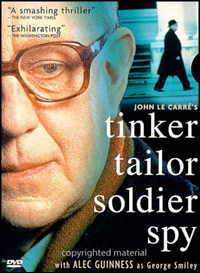 |
||
| Cover art for "Tinker, Tailor, Soldier, Spy" |
While we're in the mood for British miniseries, Acorn also brings us Brideshead Revisited: 30th Anniversary Edition. This one is offered in a new transfer on both DVD and Blu-ray. Jeremy Irons, Anthony Andrews, John Gielgud, Claire Bloom and Laurence Olivier, the latter in an Emmy-winning role. "Brideshead" — based on the novel by Evelyn Waugh — is spread across some 11 episodes, taking up some 11 hours. New bonus features include an audio commentary by director Michael Lindsay-Hogg plus two episode commentaries; also on hand is "Revisiting Brideshead", from the 2006 DVD release.
*
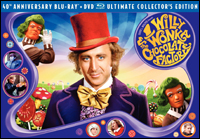 |
||
| Cover art for "Willy Wonka & The Chocolate Factory 40th Anniversary Ultimate Collector's Edition" |
Three discs are included: a Blu-ray, a DVD version, and a second DVD with special features. Said features include "Mel Stuart's Wonkavision," a new interview with the director, plus a featurette on author Dahl. Stuffed in the box is the 144-page "Pure Imagination: The Making of Willy Wonka & The Chocolate Factory," by Mel Stuart with Josh Young. Then there is a purple folder containing facsimiles of original documents, including letters welcoming the cast as they were hired plus an early casting list. (Cagney, Kaye, Sellers, Bolger, Ritchard, Chevalier and even Gene Kelly. Wilder is sixth on the list.)
Most fascinating is a three-page handwritten letter from Wilder to Stuart reacting to the costume sketches he was sent. He approves many of the elements, then goes after things he discerns could be better. ("The hat is terrific, but making it 2 inches shorter would make it more special. . . To match the shoes with the jacket is fey. To match the shoes with the hat is taste.") Also included is a Wonka Bar tin containing scented pencils and a chocolate eraser. No candy, alas; but you do get Wonka's Golden Ticket, which will bring one lucky winner not to the chocolate factory but to the Warner Bros. Studio in L.A.
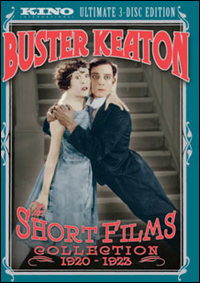 |
||
| Cover art for "Buster Keaton: The Short Films Collection 1920-23" |
*
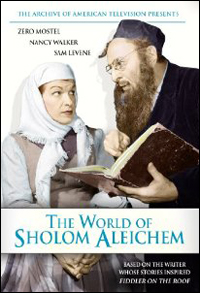 |
||
| Cover art for "The World of Sholom Aleichem" |
Six years later, "The Play of the Week" — a quality anthology series that lasted less than two seasons — brought "The World of Sholom Aleichem" to television. Only Carnovsky and Gilford remained from the stage production; the big star added to the package, presumably to garner viewers, was Gertrude Berg (of "The Goldbergs"). Most important to the success of the program — and most interesting from the vantage point of today — is Zero Mostel. This was a year after he received an Obie Award for the Off-Broadway "Ulysses in Nighttown." As "The World of Sholom Aleichem" aired, Mostel started rehearsals for what was meant to be his grand Broadway comeback in the David Merrick/Garson Kanin "The Good Soup." Mostel was hit by a bus and severely injured, causing him to withdraw. A year later, though, he stormed Broadway with his Tony-winning turn in Rhinoceros."
"The World of Sholom Aleichem" consists of two one-acts and a third, brief playlet (adapted from a story not by Aleichem but by I.L. Peretz). Mostel stars in the first and appears in small — but impossible not to notice — roles in the others. The first is about a religious teacher in Chelm who is sent to buy a goat for milking; with Nancy Walker as the wife, he is extremely henpecked. Lee Grant, another blacklist victim, sells Zero the goat — which is a female goat but changes into a male goat and back and forth. The second piece stars Gilford — on leave from the Broadway run of Once Upon a Mattress — as "Bontche Schweig," a Job-like peasant. The third and meatiest is "The High School," starring Berg but stolen by Carnovsky in a seemingly-thankless role that turns galvanizing in the final scene. Production quality is low, and the reproduction from the original videotape is less than optimal. But the chance to watch Mostel in "The World of Sholom Aleichem," five years before Fiddler on the Roof, is intriguing. There's no Tevye here, no daughters and no pogrom. Zero does have an abrasive wife who stands in for Golde (and who, in Walker's hands, is mighty tart); he does get to muse upon what life would be if he were a rich man; and — in a non-singing, non-dancing play — manages to get in enough singing and dancing to suggest what was to come.
*
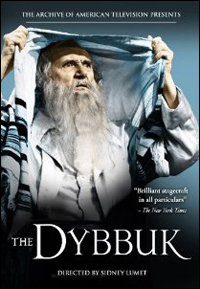 |
||
| Cover art for "The Dybbuk" |
(Steven Suskin is author of the recently released Updated and Expanded Fourth Edition of "Show Tunes" as well as "The Sound of Broadway Music: A Book of Orchestrators and Orchestrations," "Second Act Trouble" and the "Opening Night on Broadway" books. He also pens Playbill.com's Book Shelf and On the Record columns. He can be reached at [email protected].)
*
Visit PlaybillStore.com to check out theatre-related DVDs for sale.









